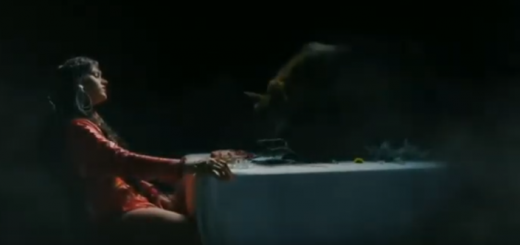Dolerme by Rosalía Lyrics Meaning – Navigating Heartbreak and Self-Liberation in a Modern Love Anthology
- Music Video
- Lyrics
-
Song Meaning
- A Manifesto of Self-Prioritization: Rosalía’s Reclaiming Anthem
- Crashing Into Clarity: The Search for Self in ‘Dolerme’
- Desperate for Detachment: The Psychological Layers of ‘Dolerme’
- The Reverberating Echoes of ‘Deprisa, deprisa, deprisa’
- Unwinding the Pain: The Hidden Meaning of ‘Lo que les espera’
Lyrics
Y yo cambié lo mío por lo que tú querías
Por todas esas veces que me puse detrás
Y yo cambié lo mío por lo que tú querías
Esas bixis que ahora tienes baby, no saben que
Esas bixis que ahora tienes baby, no saben que
Lo que les espera, lo que les espera, lo que les espera
Yo ya no sé por qué no quiere dolerme
Acelero pa’ ve’ si consigo estrellarme
Quiero que lo veas y no pienses en detenerme
Y así demuestras que has podido olvidarme
¿O por qué no pones tú también de tu parte?
Pisa a fondo y deja ir el volante
Que no tenga que ir yo una vez más a buscarte
Porque sé que no podrás atreverte
Deprisa, deprisa, deprisa
Que no sea mañana
Me parto la camisa
Deprisa, deprisa, deprisa
Que no sea mañana
Que no sea mañana
Yo ya no sé por qué no quiere dolerme
Acelero pa’ ve’ si consigo estrellarme
Quiero que lo veas y no pienses en detenerme
Así demuestras que has podido olvidarme
¿O por qué no pones tú también de tu parte?
Pisa a fondo y deja ir el volante
Que no tenga que ir yo una vez más a buscarte
Porque sé que no podrás atreverte
Yo ya no sé por qué no quiere dolerme
Yo ya no sé por qué no quiere dolerme
Rosalía’s ‘Dolerme’ is not just another melancholic ballad; it’s a confessional piece that dances on the edge of anguish and self-discovery. The Spanish songstress, known for her blend of flamenco roots with contemporary rhythms, weaves a tale of heartache and the pursuit of self-liberation that resonates universally.
The song’s title, which translates to ‘Hurt Me’ in English, is a paradoxical embrace of pain – a theme that challenges listeners to find empowerment in the depths of their own vulnerability. Rosalía’s poignant lyrics and haunting delivery create a space where sorrow meets strength, and the listener is invited to decipher the layers of emotion and meaning etched within each verse.
A Manifesto of Self-Prioritization: Rosalía’s Reclaiming Anthem
‘Dolerme’ denotes a sonic and lyrical departure from the subservient lover’s narrative. Portrayed in the lines ‘Por todas esas veces que me puse detrás / Y yo cambié lo mío por lo que tú querías,’ the artist confesses past tendencies to sacrifice her needs for her partner’s desires. The song unravels this trope and reclaims personal agency, heralding a new era where self-sacrifice is no longer romanticized.
Through its defiant chorus, the song underscores the arduous journey from passivity to self-affirmation. Rosalía’s voice, imbued with both resilience and despair, signals a turning point, embodying a person who has reached the limits of their self-effacement and is now ready to forge a path that honors their identity and aspirations.
Crashing Into Clarity: The Search for Self in ‘Dolerme’
Like the tires screeching against the tarmac, Rosalía’s lyrics ‘Acelero pa’ ve’ si consigo estrellarme’ speak to the desperate acceleration toward self-destruction, hoping for an emotional crash that will finally induce the pain that won’t come. The refusal to feel, against all expectations, sparks a journey of self-confrontation, where hurt is sought after as a sign of still being alive, of still being capable of feeling and healing.
The visceral imagery of pain and speed serves as a metaphor for the rush to break away from numbness and reclaim the sensations that remind us of our humanity. It is a conscious choice to crash, to forcefully collide with reality, in hopes of finding the true self amidst the wreckage of a love gone awry.
Desperate for Detachment: The Psychological Layers of ‘Dolerme’
The song ‘Dolerme’ reveals a poetic portrayal of emotional entrapment and the subsequent craving for detachment, as seen in the lines ‘Quiero que lo veas y no pienses en detenerme / Así demuestras que has podido olvidarme.’ Rosalía’s words convey a desire for her erstwhile lover to witness her descent, to confirm that they’ve moved on and to sever remaining ties of concern.
This verse underscores the complexity of emotionally disentangling from someone once significant. It is a testament to the confusing interplay of wanting to be forgotten, to induce indifference, and thereby achieve a painful yet necessary freedom. The expectation of callousness becomes a twisted lifeline, a final proof needed to begin the process of personal healing.
The Reverberating Echoes of ‘Deprisa, deprisa, deprisa’
The repetition of ‘Deprisa, deprisa, deprisa’ (which means ‘Quickly, quickly, quickly’) rings through the song like an urgent heartbeat, intensifying the need to escape the inertia of heartbreak. This refrain doesn’t just serve as a rhythmic hook, but rather as a mantra for those seeking to outrun the shadows of a former self, bound by another’s presence.
Here, speed is not just velocity but a metaphor for the rapid passage of healing time, the unyielding rush to move beyond the past and the urgency of change. With every chant of ‘deprisa,’ Rosalía’s voice hastens the listeners’ departure from the familiarity of pain, propelling them into the unknown territory of self-recovery.
Unwinding the Pain: The Hidden Meaning of ‘Lo que les espera’
One of the song’s most haunting elements is the cryptic warning, ‘Lo que les espera,’ a phrase offering a dark premonition to her ex-lover’s new entanglements. This is where ‘Dolerme’ extends beyond the personal and subtly acknowledges the cyclical nature of toxic relationships.
This line can be interpreted as both a lament and a prophecy. It is a lament for those who will inevitably cross the same thorny path of compromise and loss, and a prophecy that foretells a pattern likely to repeat itself – unless broken. It’s a poignant reminder of shared human vulnerability and the elusive quest for a love that does not diminish one’s spirit.








